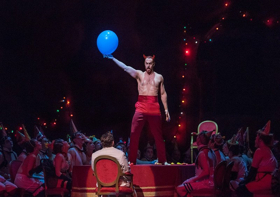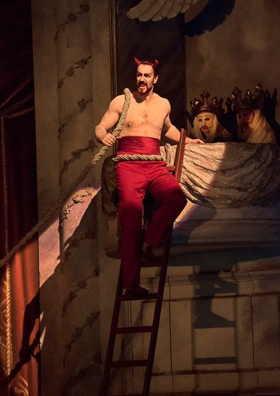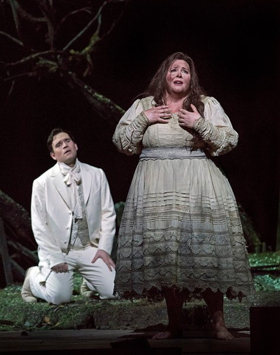Review: A Devilishly Good Van Horn Steals MEFISTOFELE at the Met

The Met is offering Robert Carsen's 1999 production of Arrigo Boito's MEFISTOFELE to show us what bass-baritone Christian Van Horn--winner of this year's Richard Tucker Award--could do in his first starring role at the house and the answer was: plenty.
From the moment he crawled out of the orchestra pit with a red violin and matching case in tow, van Horn had the audience firmly in his grasp. Of course, by this time, he'd already appeared in the prolog, bargaining for Faust's soul, and shown us what kind of instrument he possesses: commanding, sure and smooth. He took his big Act I aria, "Son lo spirito che nega"--showing that he was his own biggest fan--and had a field day. As he took charge of things, I could only think of that Alan Jay Lerner line from MY FAIR LADY (still next door at the Beaumont): "Oozing charm from every pore, he oiled his way around the floor..."

Karen Almond/Met Opera
Van Horn carried his 6-foot 5-inch frame easily (though he has claimed to slump somewhat because of it), with hard-worked pecs frequently in view in the shirts-off production. Even with his bigger than life physical presence, the singer seemed very much at the fore without ever hulking. (Luckily, his Faust, tenor Michael Fabiano, is no small fry.) Plus, he seemed to be having a good time as one of the baddest bad-boys in opera.
I missed Ramey's turn at the opera here 20 years back when the production was new--though I remember him rolling around the stage in his tights in a sinewy, athletic performance across the plaza at what I will continue to call the New York State Theatre, then home of the old New York City Opera. I can only imagine that the Met's production was tailored to his strengths, both physical and vocal, since he'd made the role something of a calling card.
(Of course, Ramey had his own icon to live up to: The opera's rebirth, as far as New Yorkers were concerned, was the star performance of bass-baritone Norman Treigle--who'd also been Caesar to Sills's star-making Cleopatra in GIULIO CESARE--in Tito Capobianco's production of 1969. Treigle unfortunately died before he was 50, at which point Ramey took over the role and ran with it, relying on his physique as much as his voice to put across the director's muscular vision.)
Still, Van Horn is quite a good fit for it. And--should he ever get the chance to do it again (beyond the next few weeks at the Met)--he would likely figure out how to add his own touches to it to complement his resonant singing that, as a bass-baritone rather than a bass, sits just above some of the very lowest notes the role demands.

Photo: Karen Almond/Met Opera
That said, despite some great moments--the chorus has a field day in the prolog, epilog and with Van Horn in the Witches' Sabbath (including prosthetic genitalia) and there are several gorgeous arias for the leads-- the opera is frankly more than a little bit of a mess, never quite hanging together very well. For me, it definitely not helped by Robert Carsen's production, staged this time by Paula Suozzi, with sets and costumes by Michael Levine.
Oh, there are enough pious/campy/audience-related in-jokes to keep our eyes, and sometimes our ears, occupied (one scene for the three leads seemed to take place on what looks like a miniature golf), but the glacial scenery changes killed any kind of continuity that might have made it seem more than a bunch of scenes thrown together. The production often looked like Carsen saw the opera as a puzzle, ie, "What can I do next?", and it resulted in what appeared to be one endless scene change after another, making the opera feel like more than its 3 ½ hours. (NB: There are four acts, besides the prolog and epilog--though, thankfully only two intermissions.) It made me wonder: What was he thinking?
The answer probably was: Can this opera be saved? Its premiere at La Scala in Milan didn't cause dancing in the aisles but, rather, riots in the streets, before it was withdrawn after just two performances. (Imagine a time when a new opera inspired that kinds of passion!) It reappeared less than a decade later in a different form and had better luck, though never exactly giving anyone a reason to take it up in place of FAUST, Gounod's version of the same story by Goethe, except when a star like Tebaldi, Siepi, Chaliapin or Gigli suddenly thought, "What if we did...?"
As Faust, tenor Fabiano was much more at home at the Met than he was at Carnegie Hall last week at the Tucker concert at Carnegie. His scale and ardor were just right for reaching the furthest corners without much effort. Still, he appeared to be an angry young/old man (or just wild-eyed) here more often than not, even when he needs romance for pursuing Margherita.
The production's Margherita, Angela Meade, was the put-upon maiden Faust impregnates and abandons before having some last-minute guilt. The role is much smaller role than its counterpart, Marguerite, in the Gounod version, and there is no brilliant "Jewel Song" as a payoff. But her Act III mad scene in jail (after killing her mother and daughter) is a good consolation prize, as Meade used every opportunity offered her to remind us why she is such a valuable member of the company.
Tenor Raul Melo did well early in the opera as one of the old Faust's students (the poor guy had to wait around a long time for his curtain call), while mezzo Jennifer Check was a tempting, though hard-edged Helen of Troy, a role frequently doubled by the soprano singing Margherita. (Mezzo Samantha Hankey made a good debut as Pantalis, Helen's handmaid, and I look forward to hearing her in something more substantial.) Mezzo Theodora Hanslowe was Margherita's neighbor Marta.
The biggest star of the evening after Van Horn was, of course, the Met chorus, under Donald Palumbo, which was in first-class form, as was the indefatigable Met orchestra under Carlo Rizzi, all working to keep the opera steaming ahead as much as the scenery allowed.
Boito cemented his place in opera history with two words: OTELLO and FALSTAFF, the two Verdian masterpieces for which he supplied the equally masterly libretti. (He also wrote the revised SIMON BOCCANEGRA and [using a pseudonym] Ponchielli's LA GIOCONDA.) Too bad Boito didn't get to work with Verdi more often, because, as we well know, a good librettist is hard to find. Middling composers, well, that's another story.
###
Additional performances of MEFISTOFELE will take place on November 12, 16, 19, 24 and 27 and the matinee on December 1. Curtain times vary: complete schedule here. Running time is 3 hours and 29 minutes, with two intermissions.
Tickets begin at $25; for prices, more information, or to place an order, please call (212) 362-6000 or visit www.metopera.org. Special rates for groups of 10 or more are available by calling (212) 341-5410 or visiting www.metopera.org/groups.
Same-day $25 rush tickets for all performances are available on a first-come, first-served basis on the Met's Web site. Tickets will go on sale for performances Monday-Friday at noon, matinees four hours before curtain, and Saturday evenings at 2pm. For more information on rush tickets, click here.
Videos

